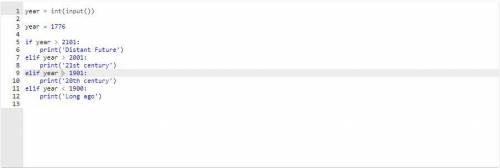Write an if-else statement with multiple branches.
If year is 2101 or later, print "Distant fu...

Computers and Technology, 22.02.2020 23:27 AdoNice
Write an if-else statement with multiple branches.
If year is 2101 or later, print "Distant future" (without quotes). Otherwise, if year is 2001 or greater, print "21st century". Otherwise, if year is 1901 or greater, print "20th century". Else (1900 or earlier), print "Long ago".
Sample output with input: 1776
What am I doing wrong here
I've tried it with =>
and just >
It isn't running the final submission
Testing with input: 1901
Output differs. See highlights below.
Your output
Long ago
Expected output
20th century


Answers: 1


Another question on Computers and Technology

Computers and Technology, 21.06.2019 17:20
What do you need to know & understand about global expansion.
Answers: 2

Computers and Technology, 21.06.2019 17:30
Data for which there is temporarily no room in ram is diverted to where on your computer? question 9 options: a) the paging file on the hard drive b) the system file on the hard drive c) the memory file on the hard drive d) the cpu cache
Answers: 2

Computers and Technology, 23.06.2019 16:00
What is the biggest difference between section breaks and regular page breaks? section breaks are more difficult to add than page breaks. section breaks make it easier for you to view the document as an outline. section breaks allow you to have areas of the document with different formatting. section breaks are smaller than regular page breaks.
Answers: 2

Computers and Technology, 23.06.2019 17:30
When making changes to optimize part of a processor, it is often the case that speeding up one type of instruction comes at the cost of slowing down something else. for example, if we put in a complicated fast floating-point unit, that takes space, and something might have to be moved farther away from the middle to accommodate it, adding an extra cycle in delay to reach that unit. the basic amdahl's law equation does not take into account this trade-off. a. if the new fast floating-point unit speeds up floating-point operations by, on average, 2ă—, and floating-point operations take 20% of the original program's execution time, what is the overall speedup (ignoring the penalty to any other instructions)? b. now assume that speeding up the floating-point unit slowed down data cache accesses, resulting in a 1.5ă— slowdown (or 2/3 speedup). data cache accesses consume 10% of the execution time. what is the overall speedup now? c. after implementing the new floating-point operations, what percentage of execution time is spent on floating-point operations? what percentage is spent on data cache accesses?
Answers: 2
You know the right answer?
Questions



Chemistry, 11.06.2020 00:57

History, 11.06.2020 00:57


English, 11.06.2020 00:57




Mathematics, 11.06.2020 00:57


Physics, 11.06.2020 00:57


Chemistry, 11.06.2020 00:57

English, 11.06.2020 00:57

Mathematics, 11.06.2020 00:57



Mathematics, 11.06.2020 00:57

Mathematics, 11.06.2020 00:57



